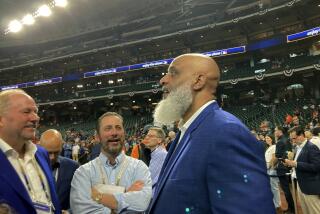Usery Plan Goes to Clinton Today : Baseball: Mediator’s proposal for ending six-month strike could be imposed upon owners and players unless they reach a settlement beforehand.
- Share via
WASHINGTON — Special mediator William J. Usery will now attempt to do what baseball’s owners and players have been unable to do during six months of off and on labor negotiations.
With President Clinton again emphasizing Sunday his serious desire for a quick settlement, Usery said he would respond to the administration’s deadline and the ongoing lack of bargaining progress by delivering his own settlement proposal to Clinton and the two sides today, when acting commissioner Bud Selig is expected to join the process.
“We can’t continue to move in inches when we need to move in yards,” Usery said. “It’s time consuming, and we need to speed up the process.”
Usery conducted a serious of separate meetings with owners and players on Sunday, soliciting their bottom-line positions on the critical issues, held a 45-minute meeting with Clinton and Labor Secretary Robert Reich at the White House, and then returned to a downtown hotel for more meetings with the owners and players.
“I have told both parties I will put together a proposal that I will present to the President (by 5 p.m. today) and then submit to the parties,” Usery said.
“Hopefully, it will be acceptable to the parties and we can get something done. Everybody would prefer that there be a voluntary settlement. Both sides want an agreement, but both sides are far apart.”
Usery initially had planned to deliver his recommendation to Clinton by noon today. On Sunday, the President suggested that he take a few more hours to see if the two sides might voluntarily produce an 11th-hour miracle.
There were no negotiations on the eve of Clinton’s deadline. The owners refused to even respond to the union’s Saturday proposal, insisting again it did not address cost containment.
Nevertheless, the sides were linked in an acrimonious new dispute:
The union said it was lifting the signing freeze that has been in place since the owners implemented their salary cap on Dec. 22; the owners responded by saying they were establishing their own signing freeze; and the union came back to call that act a provocative violation of management’s Friday agreement with the National Labor Relations Board to avoid sanctions by removing the cap and restoring the terms and conditions of the old bargaining agreement.
“To throw this kind of bomb at this point in the process,” union leader Donald Fehr said, “suggests the bomb is going to explode. It’s a good thing the damage can be repaired, and it will be.”
Fehr said management’s freeze represented collusion under terms of the old agreement, which became effective again at midnight, and exposed the owners to the risk of treble damages. He said there are a multitude of legal avenues the union can pursue and will, starting with the NLRB.
In announcing management’s freeze, counsel Chuck O’Connor said that until there was a labor agreement the owners’ Player Relations Committee would act as a single employer, taking away signing rights from the 28 clubs. He cited labor law and insisted it was not a violation of the spirit or terms of the owners’ agreement with the labor board.
“This action is taken at a point in time when clubs do act in concert--it’s called collective bargaining,” O’Connor said.
He suggested that the signing controversy could prove academic--hopefully within 24 hours, he said--if Usery’s recommendation, expected to include 1995 terms and conditions, leads to a settlement.
Usery, however, will have to be Solomon if he can find a comprehensive compromise amid the complex issues separating the sides since the players went on strike on Aug. 12. The clubs have lost more than $500 million in revenue pursuing a new system, and the players have forfeited more than $200 million in salary fighting imposition of payroll restraints and loss of free agency.
“I can’t make any judgment until I see the recommendation,” said Fehr.
If Usery’s recommendation is rejected, the next step isn’t clear. Clinton may pursue binding arbitration or ask Congress to draft special legislation that would incorporate Usery’s recommendation as an implemented settlement.
Usery, a former labor secretary, has mediated some of the nation’s most difficult labor disputes, but he returned from his Sunday briefing with Clinton and said: “I’ve never received a stronger request to get a voluntary settlement, but I’ve never faced a tougher job doing it.”
Said Reich: “The President emphasized the urgency of a rapid settlement. The next 24 hours are critical.”
More to Read
Go beyond the scoreboard
Get the latest on L.A.'s teams in the daily Sports Report newsletter.
You may occasionally receive promotional content from the Los Angeles Times.










